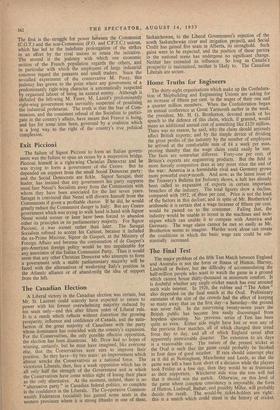Home Truths • for Engineers
The thirty-eight organisations which make up the Confedera- tion of Shipbuilding and Engineering Unions are asking for an increase of fifteen per cent. in the wages of their one and a quarter million members. When the Confederation began its annual conference at Great Yarmouth earlier in the week, the president, Mr. H. G. Brotherton, devoted much of his speech to the defence of this claim, which, if granted, would mean an additional annual cost of something like £120 million. There was no reason, he said, why the claim should seriously affect British exports; and by the simple device of dividing the gross profits of the industry by the number of employees he arrived at the comfortable sum of £4 a week per man, proving thereby that the wage claim could easily be met. The facts are somewhat different. Forty-one per cent. of Britain's exports are engineering products. But the field is more fiercely competitive than at any point since the end of the war: America is a formidable rival and Germany grows more powerful every month. And now, as the latest issue of the Treasury's Bulletin for Industry shows, a halt has already been called to expansion of exports in certain important branches of the industry. The total figures show a decline, compared with 1952, of three per cent. Price is not the least of the factors hi this decline; and in spite of Mr. Brotherton's arithmetic it is certain that a wage increase of fifteen per cent. would be passed on to the consumer. Failing that, the industry would be unable to invest in the machines and tech- niques which can enable it to compete with America and Germany. The wage claim cannot be met so easily as Mr. Brotherton seems to imagine. Harder work alone can create the conditions in which the basic wage rate could be sub- stantially increased.


































 Previous page
Previous page